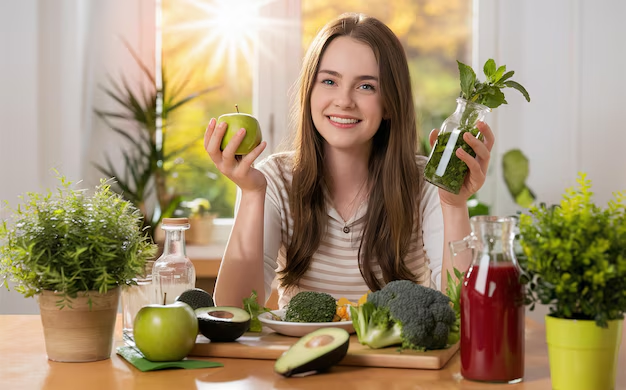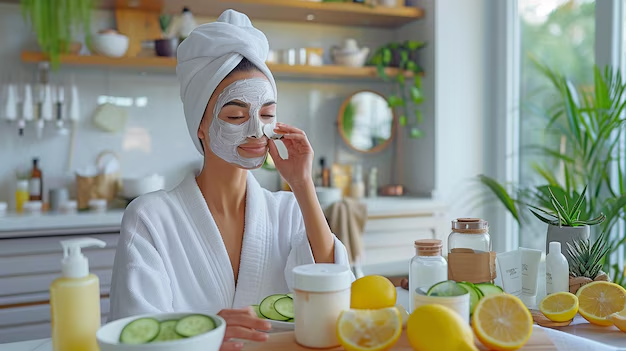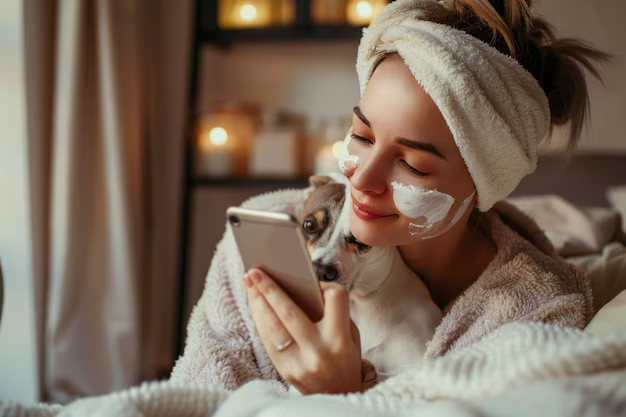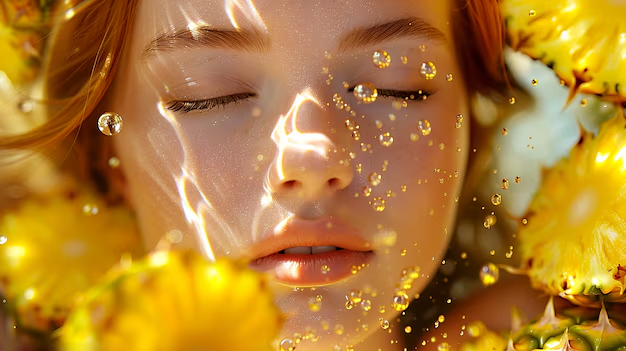Vegan Skincare For Women: Natural Beauty Guide
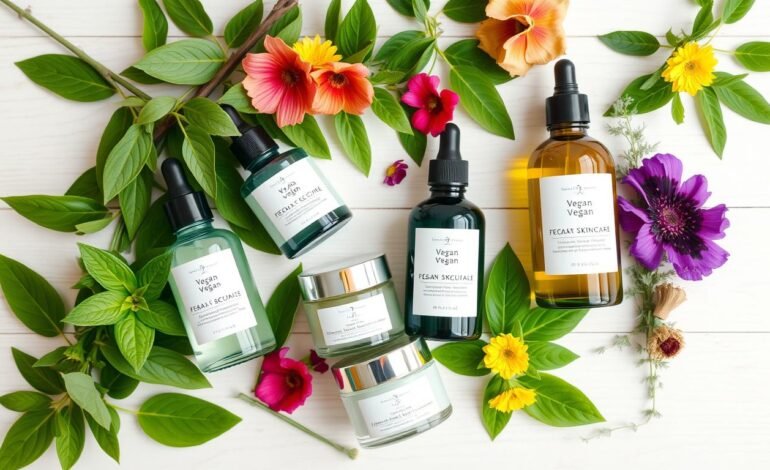
The beauty world is changing fast, moving towards vegan skincare. More people want natural beauty options that are cruelty-free and plant-based. Vegan skincare means using products without animal ingredients or by-products Vegan Skincare For Women.
These ethical cosmetics are becoming more popular. They include facial creams, moisturizers, serums, sunscreens, exfoliators, and cleansers. They’re not just good for you, but also for animals.
Key Takeaways
- Vegan skincare is a fast-growing segment in the beauty industry.
- Popular vegan products include facial creams, moisturizers, serums, sunscreens, exfoliators, and cleansers.
- Vegan skincare products are often packed with minerals, vitamins, and antioxidants.
- The Vegan Society seal certifies products as 100% free from animal products.
- Vegan brands like Derma E, ACURE, Nuria Beauty, UpCircle, and Skinveda offer 100% vegan and cruelty-free products.
Understanding Vegan and Cruelty-Free Beauty Products
In the world of beauty, “vegan” and “cruelty-free” are key terms for those who care. These labels mean different things, so it’s important to know the difference.
Difference Between Vegan and Cruelty-Free Labels
Vegan products don’t use any animal parts or by-products. Cruelty-free products, however, haven’t been tested on animals at any stage.
It’s possible for a product to be cruelty-free but not vegan. For instance, some cosmetics might not use animal ingredients but still test on animals. Also, a vegan product might not be cruelty-free if it’s tested in places where it’s required by law.
Common Certifications and What They Mean
There are certifications to help you find vegan and cruelty-free beauty. The Leaping Bunny logo means a product isn’t tested on animals. The Vegan Society and Vegan Certified labels show a product has no animal ingredients.
Important Product Labels to Look For
When you’re looking for vegan and cruelty-free skincare, watch for these labels:
- Leaping Bunny: Shows a product is cruelty-free and not tested on animals.
- Vegan Society: Means a product is vegan and cruelty-free.
- Vegan Certified: Confirms a product is vegan and cruelty-free.
Knowing the difference between vegan and cruelty-free helps you choose the right products. This way, you support brands that care about ethics and sustainability.
The need for animal-friendly beauty products is rising. More and more products are getting certifications and labels to show they’re vegan and cruelty-free. By choosing these products, you help brands that focus on being ethical and sustainable.
Essential Ingredients in Natural Vegan Skincare
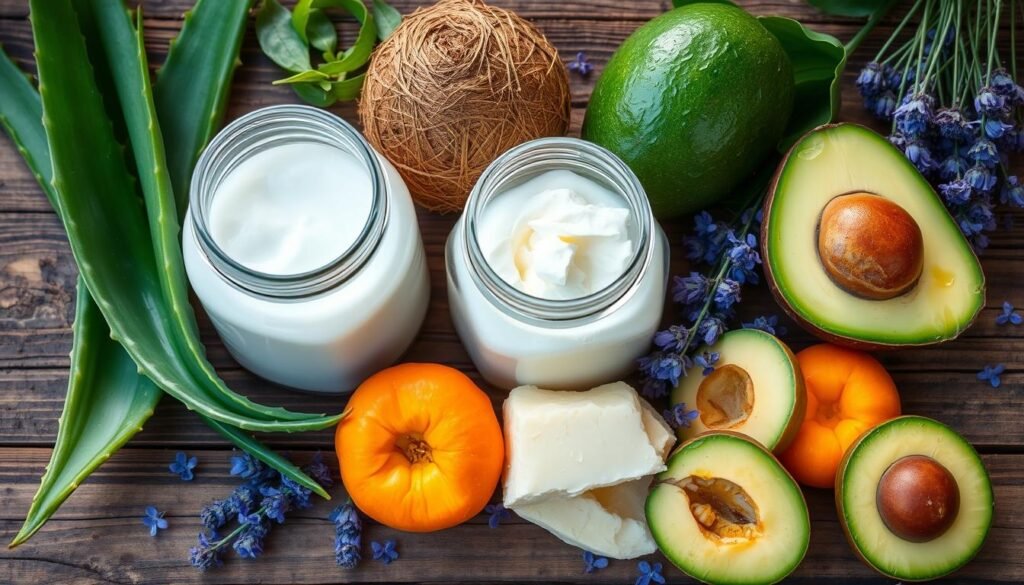
The world of natural skincare has changed with the rise of plant-based ingredients. Vegan beauty ingredients like aloe vera, shea butter, and coconut oil are now popular. They nourish and rejuvenate the skin without using animal products.
Aloe vera is great for sensitive skin because it soothes and hydrates. Shea butter is full of antioxidants and moisturizers, making it a key ingredient in vegan beauty products. Jojoba oil is also prized for its moisturizing and anti-inflammatory properties.
Coconut oil is good for skin issues like eczema and psoriasis because of its anti-inflammatory and antibacterial qualities. Sunflower seed oil helps keep the skin’s barrier strong and improves moisture.
| Ingredient | Key Benefits | Skin Concerns Addressed |
|---|---|---|
| Aloe Vera | Soothing, Hydrating | Sensitive Skin |
| Shea Butter | Antioxidant, Anti-inflammatory, Moisturizing | Dry, Aging Skin |
| Jojoba Oil | Moisturizing, Anti-inflammatory, Antioxidant, Antibacterial | Acne, Inflammation, Dehydration |
| Coconut Oil | Anti-inflammatory, Antibacterial, Antiviral, Antifungal | Eczema, Dermatitis, Psoriasis |
| Sunflower Seed Oil | Skin Barrier-enhancing, Moisturizing | Dry, Dehydrated Skin |
Ingredients like tea tree oil and chamomile are leading the natural skincare movement. They offer eco-friendly and vegan beauty solutions that care for the skin and the planet.
“The shift towards natural skincare is a testament to the rising consumer interest in sustainable and ethical beauty options that prioritize skin health and environmental consciousness.”
Non-Vegan Ingredients to Avoid in Skincare Products
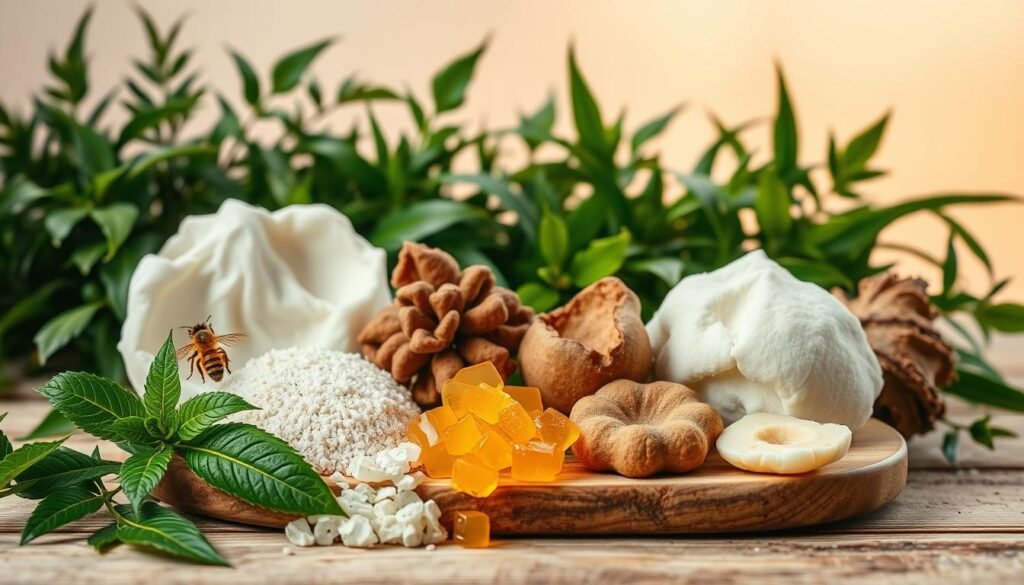
When picking skincare products, knowing about non-vegan ingredients is key. These include collagen, gelatin, beeswax, and more. They might offer benefits but harm animals and don’t fit with cruelty-free beauty.
Animal-Derived Ingredients
Many products have animal parts that we should watch out for. These are:
- Collagen: Comes from animal skin, bones, and tissues
- Gelatin: Made from boiling animal bones and tissues
- Beeswax: Comes from bees making honey
- Lanolin: From sheep’s wool
- Carmine: A red dye from crushed insects
- Cholesterol: Can be from animal fats
- Silk powder: From silkworm cocoons
- Animal-derived glycerin: From animal fats and oils
Hidden Animal By-products
Some products have hidden animal parts too. It’s important to read labels well. Look for vegan options to match your values.
Controversial Ingredients to Watch For
Retinol, used for aging, might be animal-based but most products use synthetic or plant sources. Lactic acid, for exfoliating, can also be from animals. So, choose vegan-certified ones. Squalene and glycerin can be from animals or plants, so check the product info.
Knowing about these ingredients helps us choose better. We can pick cruelty-free, vegan options. This way, we enjoy skincare without harming animals or the planet.
“Switching to vegan skincare products is a powerful way to reduce your impact on animals and the environment while still enjoying the benefits of effective, high-quality formulations.”
Vegan Skincare for Women: Building Your Daily Routine
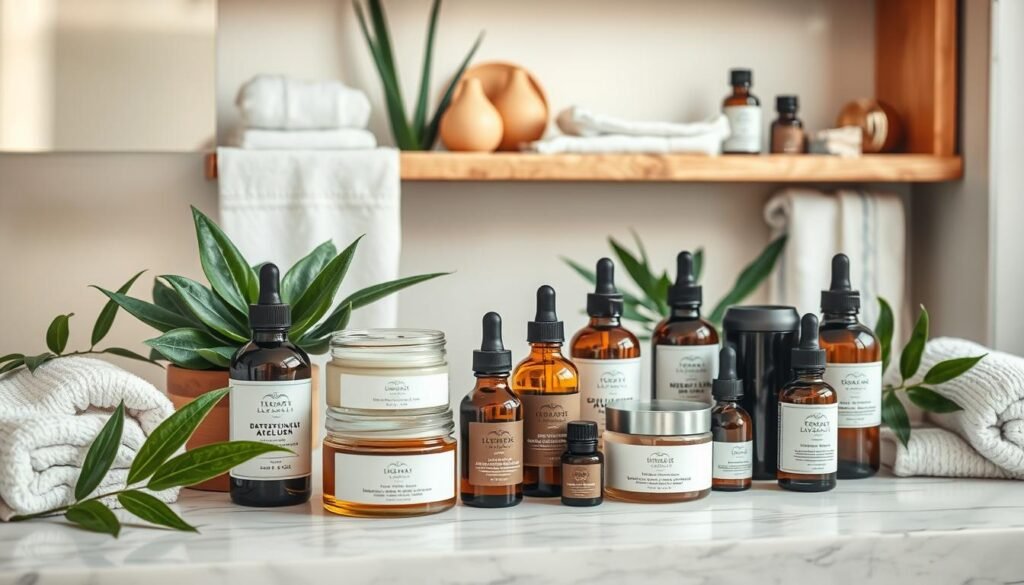
More women are looking for vegan and cruelty-free beauty products. They want to add a natural vegan skincare routine to their daily life. Creating a vegan beauty regimen is easy and straightforward.
A simple daily skincare routine includes three main steps. These are makeup removal, cleansing, and moisturizing. For a more detailed natural beauty routine, you can add toning, applying serums or oils, and using face masks.
When picking vegan skincare products, choose ones that fit your skin type and needs. Being consistent is key to getting the best results. So, stick to your routine every day.
- Cleanse: Begin and end your day with a gentle, vegan-friendly cleanser. It removes dirt and gets your skin ready for the next steps.
- Tone: Use a hydrating, alcohol-free toner to balance your skin’s pH. This helps your skin absorb other products better.
- Serum or Oil: Apply a few drops of a nourishing vegan serum or facial oil. It targets specific skin issues like dryness or wrinkles.
- Moisturize: Use a rich, creamy vegan moisturizer to keep your skin hydrated and protected. Choose one that suits your skin type.
- Mask: Treat yourself to a soothing, vegan-friendly face mask once or twice a week. It deeply nourishes and refreshes your skin.
By following these easy steps, you’ll be on your way to healthy, glowing skin. Plus, you’ll be supporting the vegan and cruelty-free movement.
“Transitioning to a vegan skincare routine has been one of the best decisions I’ve made for my skin and the environment.”
Top Benefits of Switching to Vegan Skincare
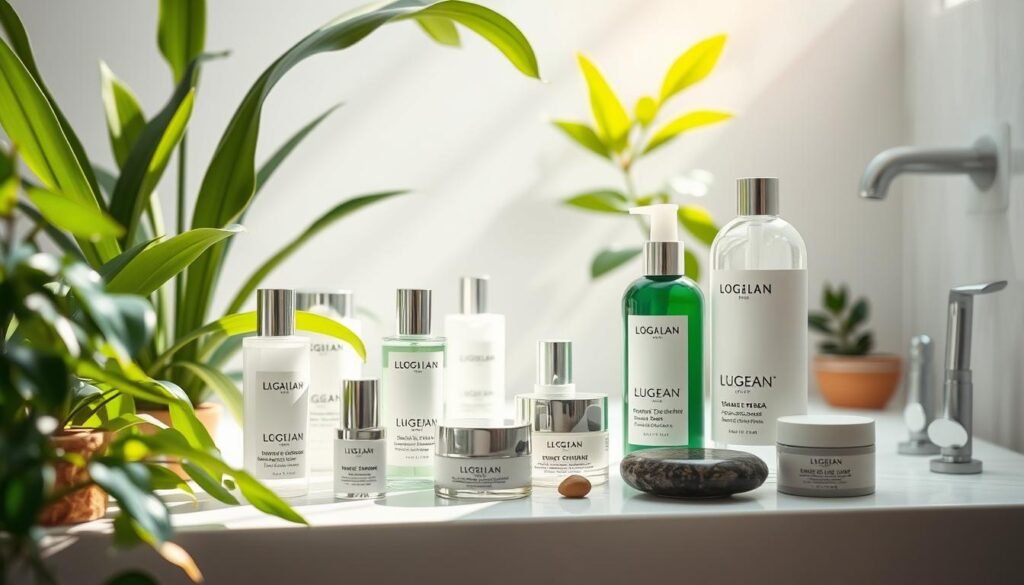
More women are choosing vegan skincare as eco-friendly and ethical beauty products gain popularity. This choice offers many benefits, including better skin health and environmental protection.
Environmental Impact
Vegan skincare products use eco-friendly ingredients, which is good for the planet. They often come in recyclable packaging, making your beauty routine greener. This helps reduce the harm caused by animal products.
Skin Health Improvements
Vegan skincare products avoid harsh chemicals, making them kinder to your skin. They’re filled with natural goodness like vitamins and antioxidants. Many people see less irritation and redness after switching.
Ethical Considerations
Choosing vegan skincare means you’re supporting cruelty-free beauty. It’s part of a growing movement against animal testing. This makes your beauty routine more compassionate and ethical.
The vegan cosmetics market is expected to hit $20.8 billion by 2025. This shows how much people want cruelty-free and eco-friendly beauty. Brands like Glamacious are at the forefront, offering vegan skincare that’s good for your skin and the planet.
Best Vegan Skincare Brands and Products
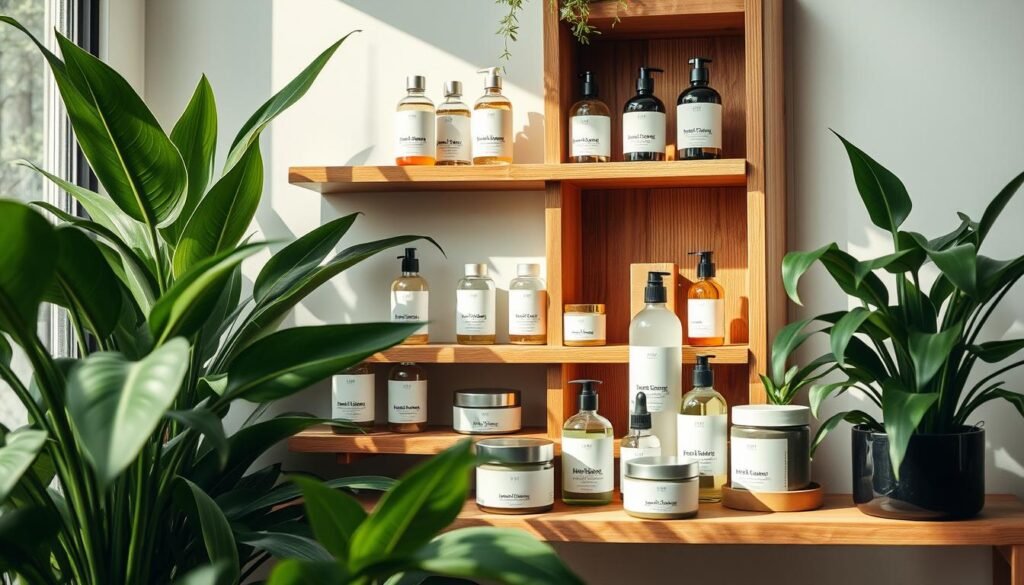
More people are looking for vegan and cruelty-free beauty options. This has led to the rise of vegan beauty brands. These brands offer natural, sustainable, and ethical skincare solutions. They provide vegan cosmetics without animal-derived ingredients or animal testing.
Derma E is a top brand with a wide range of natural skincare products. They use antioxidants and plant-based actives. ACURE is also well-liked for its focus on skin health and the environment.
Nuria Beauty is known for its vegan skincare products for all skin types. UpCircle and Skinveda stand out for their unique, sustainable ingredients and commitment to circularity.
Other great vegan beauty brands include Pacifica, The Body Shop, Youth to the People, and Herbivore Botanicals. They offer a variety of products like cleansers, moisturizers, serums, and masks. All are made without animal-derived ingredients.
“The rise of vegan skincare has been a game-changer, allowing us to indulge in luxurious self-care rituals without compromising our ethical values.”
More people are thinking about the impact of their purchases. This has boosted the demand for cruelty-free companies and natural skincare products. These vegan beauty brands are at the forefront, offering sustainable and compassionate beauty options.
How to Transition to a Vegan Skincare Routine
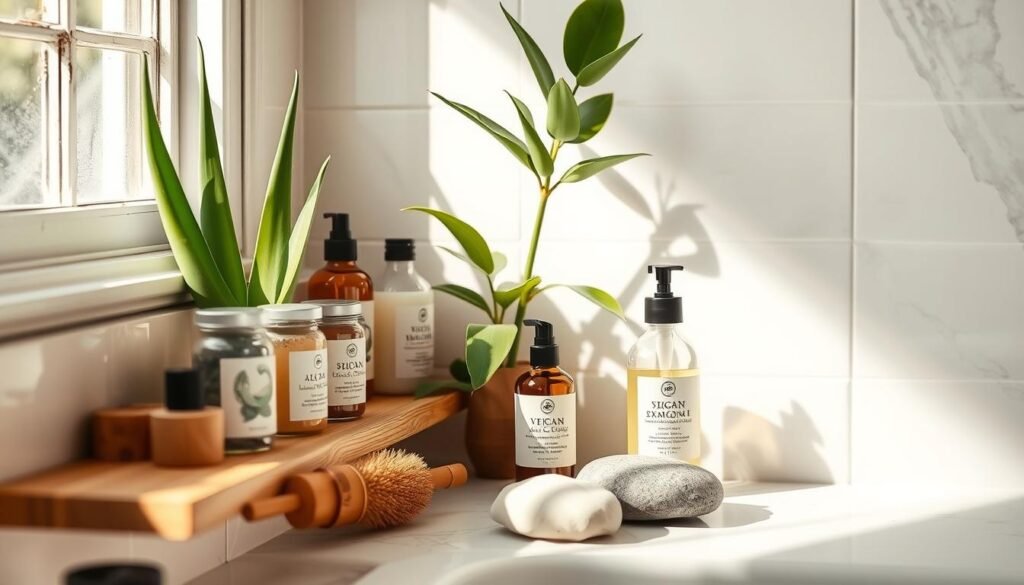
Starting a vegan beauty transition is exciting and rewarding. With more cruelty-free options available, it’s easier than ever to switch. Here’s how to smoothly add vegan products to your skincare routine.
- Start with the basics: Begin by replacing your cleanser, moisturizer, and sunscreen with vegan and cruelty-free alternatives. This provides a solid foundation for your new vegan skincare routine.
- Read labels carefully: Look for certifications like “Certified Vegan” or “Cruelty-Free” to ensure the products align with your vegan values. Avoid ingredients like lanolin, beeswax, and collagen.
- Explore vegan beauty subscriptions: Sign up for vegan beauty boxes to discover a variety of brands and products that cater to your sustainable beauty preferences.
- Transition gradually: Avoid abruptly switching all your products, as this can lead to skin irritation. Gradually replace your non-vegan items with vegan alternatives to give your skin time to adjust.
- Focus on nourishing ingredients: Look for vegan skincare products rich in vitamins, minerals, and antioxidants to support long-term skin health.
- Incorporate vegan self-care: Extend your vegan journey to other self-care practices, such as using vegan makeup, hair care, and even vegan fragrances.
Choosing a vegan skincare routine is a meaningful step towards a greener lifestyle. With patience and dedication, you can easily switch to a cruelty-free beauty routine. This will nourish your skin and match your values.
Also Read : Skincare Tips For Women: Your Daily Beauty Guide
“Transitioning to a vegan skincare routine is not only good for the environment, but it can also improve the health and appearance of your skin in the long run.”
Conclusion
Choosing a vegan beauty guide is a step towards a better skincare routine. Vegan skincare is good for your health, animals, and the planet. Now, it’s easier to find cruelty-free lifestyle options that work well.
Switching to vegan skincare can fit your needs and skin type. It shows how easy it is to use plant-based products. Brands that go vegan use eco-friendly packaging and cut down on waste.
Choosing ethical beauty choices helps create a kinder beauty world. More people want vegan skincare, showing they care about health and animals. Going vegan in beauty is a way to live in harmony with the planet and our values.
FAQs
Q: What is vegan skincare and how does it differ from traditional skincare?
A: Vegan skincare refers to products that do not contain any animal-derived ingredients or by-products. Unlike traditional skincare, vegan products ensure that no animals are harmed in the production process, making them a cruelty-free choice. This aligns with the growing demand for skincare and beauty solutions that are environmentally friendly and ethically produced.
Q: How can I choose the right moisturizer for my skin type?
A: To choose the right moisturizer, first identify your skin type, whether it’s dry, oily, or combination. For dry skin, look for moisturizers containing hyaluronic acid and natural oils like avocado or aloe. If you have oily skin, opt for an oil-free gel cream that hydrates without clogging pores. Always check for cruelty-free labels to ensure ethical sourcing.
Q: What are the benefits of using hyaluronic acid in skincare?
A: Hyaluronic acid is renowned for its ability to hydrate and plump the skin. It can hold up to 1,000 times its weight in water, making it an excellent ingredient for maintaining moisture levels. Incorporating hyaluronic acid into your routine can help brighten your complexion and reduce the appearance of fine lines, making it a popular choice for anti-aging products.
Q: How often should I exfoliate my skin?
A: Exfoliation frequency depends on your skin type. Generally, it is recommended to exfoliate 1-2 times a week for normal to oily skin and once a week for sensitive or dry skin. Using products with glycolic acid or gentle exfoliators can help purify and brighten your skin without causing irritation.
Q: What is the purpose of a toner in a skincare routine?
A: A toner helps to balance the skin’s pH after cleansing, removing any residual makeup or impurities. It can also prepare the skin for better absorption of serums and moisturizers. Look for toners that contain niacinamide or antioxidants for added benefits, especially if you are focusing on brightening and anti-aging.
Q: Can I use a face mask with avocado for hydration?
A: Yes! A mask with avocado is an excellent choice for hydration due to its rich fatty acid content. It provides deep moisture, making it ideal for dry skin. Incorporating a weekly avocado face mask can help brighten your complexion and improve overall skin texture.
Q: What is the importance of SPF in vegan skincare?
A: SPF is crucial for protecting your skin from harmful UV rays, which can lead to premature aging and skin damage. Choosing a vegan SPF product ensures that you are safeguarding your skin while adhering to your cruelty-free skincare principles. Look for broad-spectrum SPF 30 or higher for optimal protection.
Q: Why is vitamin C a popular ingredient in vegan skincare?
A: Vitamin C is celebrated for its antioxidant properties, which help to protect the skin from environmental stressors. It also plays a key role in brightening the skin tone and fading dark spots, making it a go-to ingredient for those seeking radiant skin. Incorporating vitamin C serums into your routine can enhance your anti-aging efforts.
Q: What should I look for in a cruelty-free eye cream?
A: When selecting a cruelty-free eye cream, look for products that contain hydrating ingredients like hyaluronic acid, peptides, and antioxidants. These ingredients help to plump and brighten the skin around the eyes, reducing the appearance of dark circles and fine lines. Ensure that the product is free from animal-derived ingredients and has been certified as cruelty-free.
Q: How can I incorporate vegan skincare into my body care routine?
A: To incorporate vegan skincare into your body care routine, choose body washes, creams, and lotions that are labeled vegan and cruelty-free. Look for products that use natural ingredients for hydration, such as aloe and avocado. Regularly moisturizing after showering can help keep your skin soft, supple, and healthy.
Source Links
- https://vegancuts.com/blogs/1/vegan-skincare-guide?srsltid=AfmBOopBBuoXj081Rsy29QRkRqRM5CicyMs0hNmchz1UvwITHmciemzA
- https://www.frwrdskincare.com/blogs/our-blogs/vegan-skincare-your-guide-to-natural-beauty?srsltid=AfmBOooDis2khVT3jzgtNj4MyoTcXigCG61r2CsjfRqw8ZNTmRCfu2VN
- https://ethicalelephant.com/cruelty-free-vs-vegan/

